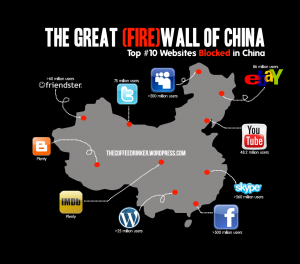In modern China’s society, when considering the relationship between people and the government, the Chinese governments institution of the “Great Firewall of China” acts as a clear point of contention. The Chinese government does not allow residents to access many popular  social media sites, such as Facebook, Twitter and Youtube, as well as sites containing certain information about the government. The limited internet access that the government authorizes these residents to utilize, is painfully slow.
social media sites, such as Facebook, Twitter and Youtube, as well as sites containing certain information about the government. The limited internet access that the government authorizes these residents to utilize, is painfully slow.
As a means of combatting this growing tide of internet censorship, many independent foreign internet companies provide an outlet for residents of China to gain internet access, virtual private networks (VPN). Wealthier residents can pay these companies in order to browse the cyber world freely. In response to the new revolution of VPNs has focused on stopping their access. The government has clearly invested time and resources to create innovative techniques that can block VPNs. The 649 million people with hindered internet access now include VPN users. On January 27th, a senior official in the Ministry of Industry and Information Technology, Wen Ku, said that these new techniques were necessary to protect what the government has labeled, “cyber-space sovereignty,” whatever that vague tag means.
The Chinese government, contrary to popular belief, does not focus on blocking post on social media that denounce or criticize the government or its policies, but rather it censors posts that contain the possibility of a collective movement. Throughout history examples of collective actions against government have led to regime changes, such as East Germany and in the Middle East. These efforts emphasize the need to protect their current regime, but in fact these policies will hurt them. Aside from the fact that residents can use other, less well-known sites to communicate from wide-ranging distances, but the foreign internet companies, who provide the VPNs, are shut out. Money and resources must be expended in order to fund new innovative firewalls. Residents of China cannot use Google services, which limits communication with other foreign companies, which will lead to strained relations and lost possible gains. Policies, like these alert countries like the United States because of China’s instinct to retreat to protectionism. In other industries, such as the air purifiers business, where foreign companies dominate have not experienced the same issues as internet providers. China’s failure and insecurity to allow their residents to evolve with the rest of the civilized world can cause financial and political issues in the future.
Works Cited:
King, Gary, Jennifer Pan, and Margret Roberts. “How Censorship in China Allows Government Criticism but Silences Collective Expression.” The American Political Science Review 107.02 (2013): 326-43. ProQuest. Cambridge University Press. Web. 11 Feb. 2015. <http://search.proquest.com/econlit/docview/1419405997/fulltext/9D1CF9C3E28E4406PQ/1?accountid=14882>.
“Internet Censorship: Plugging the Holes.” Economist 7 Feb. 2015. Print.
The Great Firewall of China. https://thecoffeedrinker.wordpress.com/tag/great-firewall-of-china/
See Ahn’s post, Cyber Censorship Threatens Chinese Businesses. What overlap / differences /tensions are there in this area? Is it costly, and if so to whom?
According to recent survey by European Union Chamber of Commerce, it turns out that the government’s reinforced enforcement of internet censorship through Great Firewall has imposed negative impact on launching businesses in China. Of Americans firms surveyed, 83 percent replied that Internet censorship affects their business performance negatively and 13 percent said they had recently deferred investment in R&D in China as restriction has tightened since 2015. Setting aside inconvenience in getting information, considerable amount of cost incurred due to censorship is discouraging foreign companies’ investment. To attract foreign investment, it is time to foster good investment environment.
It will be interesting to see how sustainable this project is for the Chinese Government. The most immediate factor in this has to be cost. The project has already cost millions of dollars, and the price of its implementation only serves to increase as the world becomes more connected through the internet. China will have to hire more and more hackers and web analysts to keep up with growing amounts of internet users who want to communicate and share ideas and information. Chinas firewall forces it to be reactionary, and with this distinction comes cost. It must try to prepare for every eventuality in a world where hackers and internet users are becoming more savvy and adept at circumventing such defenses. It will be interesting to see if the Chinese system can last under such widespread innovation from internal and external forces.